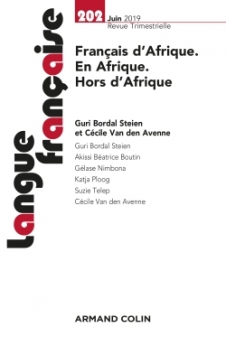
Langue française n° 202 (2/2019)
Pour acheter ce numéro, contactez-nous
Recevez les numéros de l'année en cours et accédez à l'intégralité des articles en ligne.
Depuis les premières études sur le français en Afrique, dont le but était surtout didactique durant la première période postcoloniale, les intérêts de recherche se sont différenciés dans chaque pays, selon les besoins et l’évolution du français, eux-mêmes dépendants des rapports avec cette langue. Néanmoins, jusqu’au début des années 2000, les cadres dominants en linguistique descriptive, sociolinguistique et linguistique du contact sont ceux élaborés par les chercheurs français en collaboration avec des chercheurs africains ou remaniés à partir de modèles américains grâce aux terrains africains. Depuis quelques années, l’apport des études africaines est original et particulièrement avantageux pour la linguistique générale : études fines et contextualisées du fonctionnement langagier, travaux sur les parlers des jeunes et le français métissé, recherches-actions qui associent français et langues africaines pour le développement.
From the earliest studies on French in Africa, the main goal was didactic during the first post-colonial period, research interests have been diverse in each country, as a function of the needs and evolution of French–themselves depending on their relationships with the language. Yet up to the beginning of the 21st Century, the dominant frameworks in descriptive linguistics, sociolinguistics and the study of contact languages were those developed by French scholars in collaboration with African researchers or re-worked on the basis of North American models in terms of various strands of African fieldwork. For some years now, the contribution of African studies has been both original and particularly useful for general linguistics : contextualized studies of the ways in which language functions, work on youth languages and mixed languages, and action research which associates French and African languages in the interests of development.